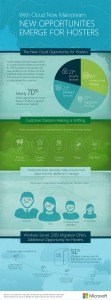REDMOND, Wash. — March 18, 2015 — With cloud computing now considered a mainstream technology for most companies, new opportunities have emerged for cloud service providers that extend beyond their traditional hosting infrastructure businesses, according to Beyond Infrastructure: Cloud 2.0 Signifies New Opportunities for Cloud Service Providers, a Microsoft Corp.-commissioned study conducted by 451 Research LLC. The study revealed that nearly 70 percent of the opportunity for cloud service providers now centers on application hosting (email and business applications), managed services (backup and disaster recovery), and security services (threat management).
 “For today’s cloud service providers, infrastructure has become only a small part of their overall service offering,” said Aziz Benmalek, general manager, Hosting Service Provider business, Microsoft. “More than 75 percent of customers are now beyond the cloud discovery phase and expect that in three years, almost half of their applications will be deployed in a combination of private and public cloud environments. This presents a significant opportunity for our service provider partners to provide value-added services to their customers. By offering these expanded services, cloud service providers will be able to drive additional consumption, increase revenue and serve as trusted advisors.”
“For today’s cloud service providers, infrastructure has become only a small part of their overall service offering,” said Aziz Benmalek, general manager, Hosting Service Provider business, Microsoft. “More than 75 percent of customers are now beyond the cloud discovery phase and expect that in three years, almost half of their applications will be deployed in a combination of private and public cloud environments. This presents a significant opportunity for our service provider partners to provide value-added services to their customers. By offering these expanded services, cloud service providers will be able to drive additional consumption, increase revenue and serve as trusted advisors.”
In addition, the study found that the service provider decision-making process has also shifted: Today, decisions are being made at a much higher level than the traditional IT manager. Fifty-two percent of respondents say their CIO or CTO is a primary decision-maker in the evaluation of hosting and cloud services, followed closely by the CEO, who is a primary decision-maker for 44 percent of companies surveyed.
“Hybrid cloud infrastructures are becoming the norm for customers,” said Michelle Bailey, senior vice president, Digital Infrastructure and Data Strategy, 451 Research. “As new decision-makers emerge, so too does the criteria for selecting cloud service providers. Trust, uptime, security, performance and technical expertise are today’s differentiators for a business-ready cloud. It’s not just about having datacenters everywhere at the lowest price. Providers need to build a business that aligns to who they are as a company and who they are supporting. Cloud 2.0 is really about value, redefining cloud computing from a technical specification to a business-ready environment. Enterprises are looking for a trusted end-to-end solution, and ultimately this will involve multiple partners.”
The study also underscored the opportunity for cloud service providers to assist customers with Windows Server 2003 migrations ahead of the July end-of-support date. Of the 73 percent of respondents with a formal Windows Server 2003 migration plan, approximately half will increase their use of hosting and cloud service providers as a result. Almost 50 percent also expect that they will deploy a newer version of Windows Server in multiple on-premises and off-premises hybrid cloud environments.
Cloud service providers can tap into infrastructure solutions such as Windows Server, Microsoft System Center, Microsoft SQL Server and Microsoft Azure, as well as applications such as Exchange Online, SharePoint, Lync, Office and Office 365. And with Cloud OS, Microsoft offers customers a comprehensive, consistent cloud solution to bridge customers’ on-premises investments with cloud-based deployments. Microsoft has added 5,000 new hosting service providers in the past 12 months and has the largest hosting community of any vendor.
Beyond Infrastructure: Cloud 2.0 Signifies New Opportunities for Cloud Service Providers was designed and conducted in conjunction with 451 Research (https://451research.com). The study surveyed more than 1,700 hosting and cloud customers across 10 countries from December 2014 through March 2015. 451 Research interviewed customers across small, medium and large enterprises, including IT operations professionals, application developers and marketing professionals. Countries covered in the study span mature and emerging markets, including Australia, Brazil, Germany, India, Japan, Netherlands, Singapore, Turkey, the U.K. and the U.S.
Full research study results can be found at http://download.microsoft.com/download/3/0/B/30B07B25-05CA-46B2-BCF6-1DE845383672/MSFT Hosting End-User Full Slide Set 3.17.15 Complete.pdf.
Founded in 1975, Microsoft (Nasdaq “MSFT”) is the worldwide leader in software, services, devices and solutions that help people and businesses realize their full potential.
Note to editors: For more information, news and perspectives from Microsoft, please visit the Microsoft News Center at http://news.microsoft.com. Web links, telephone numbers and titles were correct at time of publication, but may have changed. For additional assistance, journalists and analysts may contact Microsoft’s Rapid Response Team or other appropriate contacts listed at https://news.microsoft.com/microsoft-public-relations-contacts.




